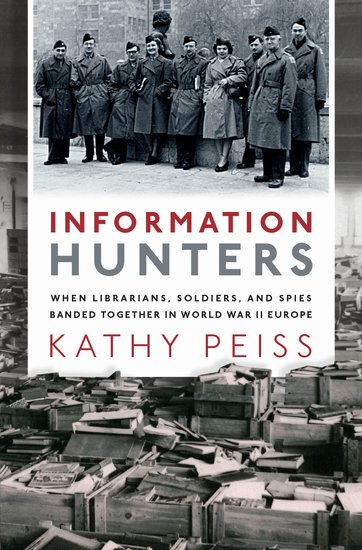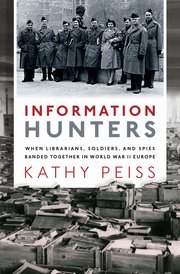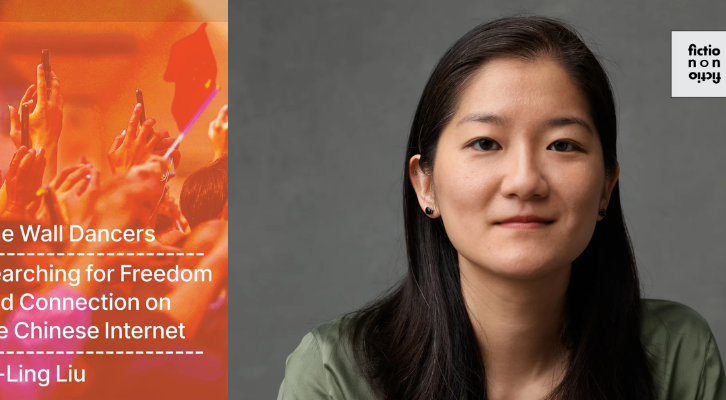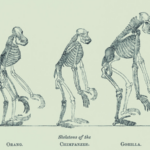This story grew out of a chance discovery of an online memorial to an uncle I never knew. Reuben Peiss had been a librarian at Harvard when World War II began, and like many in academia, he was recruited into the Office of Strategic Services, the nation’s first intelligence agency. As a field agent based in Lisbon and Bern, he developed a network of book dealers and private individuals to acquire timely publications for intelligence analysis. When the Allies pushed into Germany, he worked with documents-gathering teams to uncover records of war crimes, caches of Nazi propaganda, and book collections buried in caves and mines. After the war, he headed an overseas mission of the Library of Congress to acquire works published in wartime Germany and occupied countries for American research libraries. When he returned, he worked in the State Department and taught at the library school of the University of California, Berkeley. Plagued with chronic illness, he lived a short life, dying in 1952 at age forty.
The memorial, posted on the University of California website, took me by surprise. My parents had never told me much about my father’s oldest brother. I had never read the book he translated, Alfred Hessel’s A History of Libraries; on my bookshelf sat a rare Spinoza volume he had once owned. When I asked about his secret activities, my mother exclaimed, “Oh yes, Reuben was a spy!” But there were few memories and no letters or photographs. It did not take much searching, however, to find a paper trail, an extensive correspondence with leading American librarians, OSS colleagues, and military officials. An e-mail to the man who had recruited him led to a phone conversation and a visit. When I met eighty-nine-year-old Frederick Kilgour—a pioneer in information science—he was spry and quick-witted, answering my questions with the caginess of an old intelligence agent. There were other traces, too, that made Reuben Peiss come alive. In the Library of Congress, teletype rolls—still marked secret and requiring declassification—reproduced conversations with his boss across the Atlantic, revealing the cadence of his everyday speech and his anxiety as he faced the urgent challenge of his mission in Germany. Relatives shared their few personal letters, photographs, and even a home movie that had been transferred to videotape. Filmed without sound in the summer of 1945, it showed Reuben Peiss with his closest childhood friend, then an army doctor, the two men in uniform, smoking and chatting at an army installation in Bavaria. Most evocative was a lengthy tribute from leading lights in the library field, published not long after Peiss’s death in a memorial edition of A History of Libraries. These men remembered their colleague not only as a professional but also for a rare set of personal qualities—a combination of physical weakness and mental courage, a sharp intelligence and self-effacing sense of humor, an embrace of high culture and low, from Whitehead and Spinoza to Groucho Marx. I recognized these family traits and, wanting to know more, I dug into the archives.
Reuben Peiss was the eldest son of Russian Jewish immigrants, Alexander Peisachowitz and Rose Pasternack, who came to the United States in the early twentieth century, met, and married. When Alexander died in 1924, Rose raised their four children in Hartford, Connecticut, working as a milliner and receiving help from her brothers. Reuben Peiss, a stellar high school student, earned a scholarship from the city to go to Trinity College in 1929. He was like other day students there, many of them Jewish “strivers,” who lived at home, held jobs, needed financial aid, and were relentless in their pursuit of higher education—a source of tension at a college where affluent Protestant fraternity men dominated campus life. When he graduated, he received a fellowship from Trinity to attend Harvard University for a year of postgraduate work in philosophy, studying Spinoza and Jewish thought with the eminent scholar Harry Austryn Wolfson. Yet Harvard, too, was inhospitable and exclusionary, offering little support to Jewish students. Peiss graduated with a master’s degree in 1934, but without further funding, he suspended his doctoral work. His class photograph shows a young man dressed in a formal suit, with vest and watch chain, a shy smile and direct gaze behind round metal glasses—the well-bred look of someone trying to fit in.
Needing to earn a living in the midst of the Great Depression, he began teaching at Hartford Federal College, a community college founded as a federal emergency relief school by the Works Progress Administration. The experimental college struggled to stay open, as critics attacked both its progressive curriculum and the faculty’s leftwing politics. In 1937, Peiss decided to become a librarian, attending an accelerated program in library science at the University of Michigan. His colleagues would later extol this choice as one that recognized the affinity between “philosophy as the love of knowledge, and libraries which are the repositories of knowledge.” The truth is likely more prosaic. The future of the federal college was grim, he could not advance in academe without a PhD, and as the family’s oldest son, he felt a duty to help his mother and siblings.
In the fall of 1938, newly credentialed, he looked for work. Times were still hard, and there were few openings. He returned to Harvard as a low-level employee in the library, hired on temporary funds for a special project, the revision of the Union List of Serials, a massive guide to the periodical holdings of the major libraries across the United States and Canada. The first edition of the ULS, published in 1927 after a decade of labor, was a remarkable achievement in the age before computers but was riddled with inaccuracies and “ghosts,” as the librarians called false entries. Work on a second edition began in 1937. Harvard contained many libraries and specialized collections, each with different personalities and practices, from fussy to slipshod. “The magnitude of the task . . . has surpassed all expectations,” Peiss observed, and the librarians sometimes despaired of completing it. To break up the routine, he pulled catalog cards that fetched a laugh, with such titles as Kansas Knocker: A Journal for Cranks and National Nut News.
After the United States entered the war, his friend and coworker, Frederick Kilgour, went to Washington to work for the OSS, which actively recruited scholars and specialists from the Ivy League. Kilgour’s assignment was to organize an overseas program to acquire enemy publications. He needed seasoned librarians, he wrote his former boss, Harvard Library director Keyes Metcalf, and preferred men ineligible for the draft, “a mild 4-F such as Reuben,” whose academic knowledge, library experience, and fluency in several languages made him an obvious choice. Metcalf endorsed the suggestion: “I know that he is restless and anxious to do his share in the war.”
Reuben Peiss jumped at the chance to join the OSS and travel abroad. Arriving in Lisbon in September 1943, he quickly picked up the language and became attuned to the “machine gun” rate of speaking. The city was remarkable in its difference from every place he had known—its narrow streets and steep hills, the day full of sunlight and “night fragrant, with star-studded skies.” He marveled at the courtesy of the Portuguese, the strong family feeling, even the women with “enormous baskets of fish on their heads, striding along with magnificent posture.” He also saw the poverty and “deplorable squalor” behind the picturesque scene, and the “very deep strain of sadness running throughout life here.” In Lisbon he acquired publications from Germany and occupied countries, an open activity that at times drifted into clandestine work. At the end of 1944, when the border between Switzerland and France opened up, he went on to the OSS post in Bern, with trips to London, Paris, and Geneva. “I have been seeing the world, and it has been an exciting experience indeed,” he wrote his aunt.
When I asked about his secret activities, my mother exclaimed, “Oh yes, Reuben was a spy!”
Few letters record how he felt about those experiences or reveal his inner life. He remained single over the years; family members fleetingly mention a college sweetheart and a rumored affair with a Parisian woman, but nothing more. His feelings occasionally overcame him—his outrage over perceived antisemitism in the treatment of his brother, and the pain, visible in his handwriting, when his young sister died of leukemia. But his correspondence usually moved along easier registers—work, books, people, and immediate problems to solve.
His colleagues saw the slight librarian-scholar as a man who could get things done. Transferred to Switzerland, Peiss presented a calling card to legendary spymaster Allen W. Dulles from H. Gregory Thomas, OSS chief in the Iberian Peninsula, inscribed with a note of introduction. “He is a remarkably good man and I am sorry to lose him,” Thomas wrote in tiny script, “I am sure you will find him most useful.”5 That card survived the war, deep in an accordion file at the National Archives. In postwar Germany, Peiss was known as a scrounger, the military’s term of approval for someone who knew how to cut through red tape or work around it. He felt no compunc- tion walking up to the American proconsul of Germany Lucius D. Clay in the breakfast line to chat about a problem with book acquisition. General Clay, in turn, gave him an unintentional promotion by addressing him as “Doctor.”
Over the years, Peiss’s exploits remained vivid to those he worked with. “It’s strange the things one remembers,” commented composer Ross Lee Finney about his wartime intelligence experiences. “There was someone named Reuben . . . his work was always top secret and the less I knew about it, the better.” In a telling recollection, librarian Scott Adams, a colleague on the Library of Congress Mission, described the epic retrieval of books for American research libraries in Leipzig in the Soviet zone of occupation. Peiss was a “little wisp of a Jewish lad out of Harvard,” a “little 135 pound Spinoza scholar,” who “organized a convoy of something like fifty American Army trucks and drove them behind these Russians’ lines into Leipzig,” managing to “snap all this stuff up and get it back so that it could be delivered.”6 Adams embellished a true story—there were only four trucks and the Soviet administration cooperated with this mission—telling it as a librarian’s version of Clark Kent and Superman.
Reuben Peiss loved mysteries, and he bequeathed one to me. Uncovering his life became an obsessive search for clues buried in archives and hidden in plain sight. He led me into a world of American librarians, archivists, collectors, scholars, and soldiers, galvanized by the war to acquire and preserve the written word. His life pointed me toward a bigger story, one largely untold, of American mass collecting missions and how they mattered in a cataclysmic war.
____________________
Excerpted from Information Hunters: When Librarians, Soldiers, and Spies Banded Together in World War II Europe by Kathy Peiss. All rights reserved. Courtesy of Oxford University Press.



















